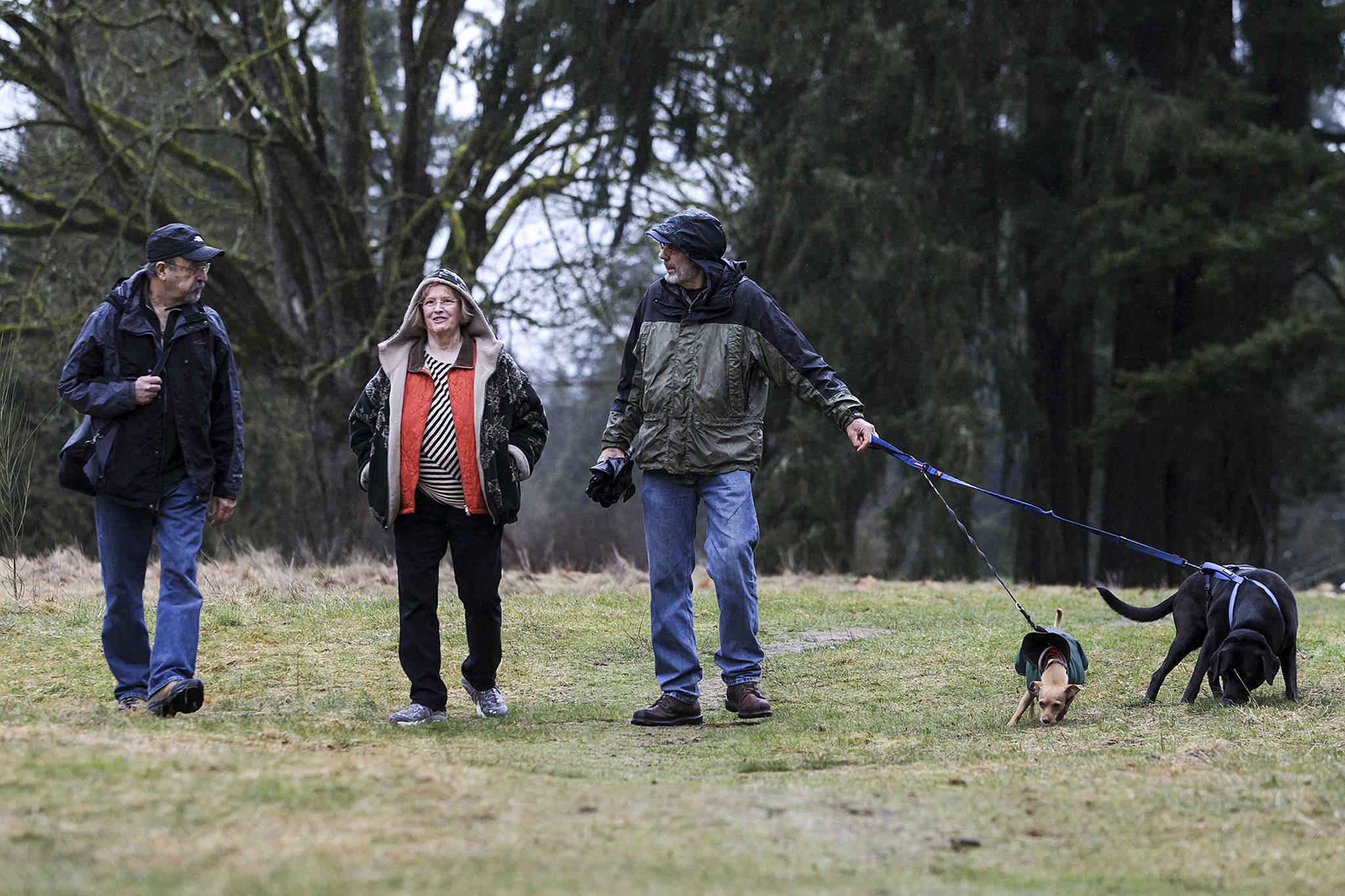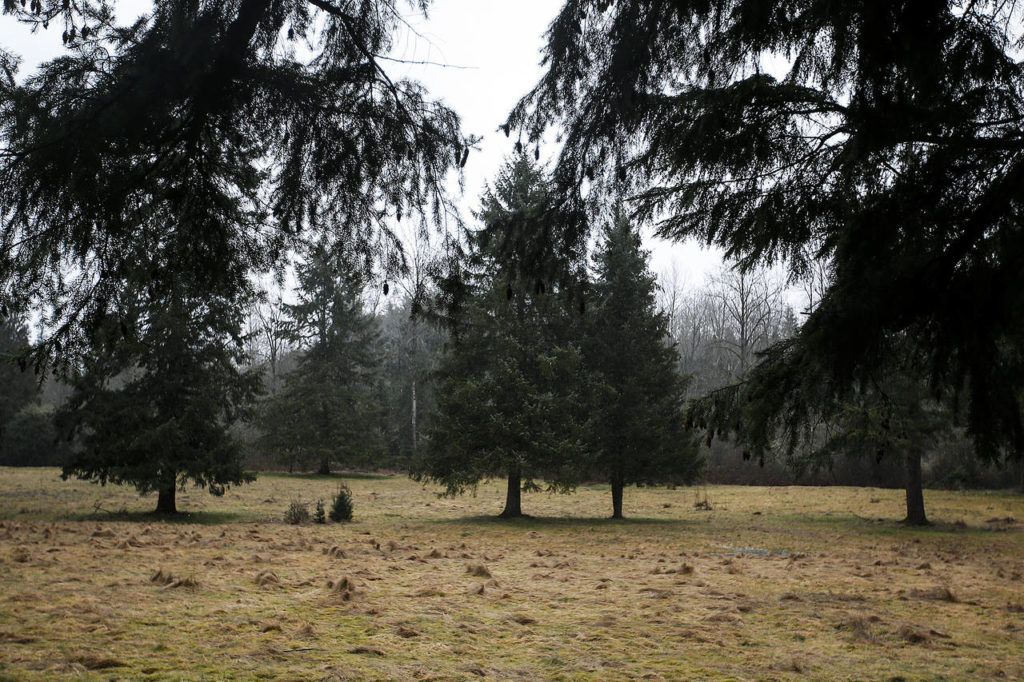MALTBY — Tranquil green hills surrounded by trees give no hint of the rancorous politics or the expensive legal fight over this patch of ground.
Venture out to Wellington Hills at most any time of day and you’re likely to find people out for a stroll, often with dogs in tow.
It’s been this way since Snohomish County bought the semi-rural property next door to Woodinville in 2012. A golf course operating there for several generations soon closed.
Neighbors have had a peaceful patch of nature to enjoy, a big beautiful back yard of more than 100 acres they share with deer, hawks, owls and bobcats.
That’s not why the county bought the property, though.
It was intended to fulfill a promise of a regional park to make up for some of the impacts of King County’s nearby Brightwater sewage treatment plant. Some people in the area reacted with shock and anger at initial plans that included lighted ball fields, 730 parking stalls, an indoor soccer arena and a mountain-bike course. The sports complex would have been superimposed on the former fairways that had grown over with a shaggy charm.
“The neighbors would like to keep it a park with minimal development,” said Bill Stankus, a semi-retiree who has lived down the road for 25 years. “It is an active area for a lot of wildlife.”
Neighbors and the city of Woodinville sued in 2013 to force the county to scale back. The park plans shrank, but opposition persisted. The county eventually gave up and tried to move on.
In a twist, the neighbors and the city are now suing to stop the county from selling the land. The Northshore School District wants to buy the property as a possible school site to handle its burgeoning student population. If the deal goes through, some neighbors fear they could lose the character of the entire community.
County officials say they can’t justify holding on to the property. Money for the purchase came from a settlement reached with King County in 2005 over the decision to put the Brightwater treatment plant in Snohomish County. The $70 million agreement provided money for parks, including two others that are already built, as well as habitat projects and road improvements.
It took the county more than five years to find a property that met the settlement conditions for a regional park: more than 40 acres and within 4 miles of the sewage plant. The park also would have to provide active recreation, which the county took to mean sports fields, playgrounds and possibly features such as cycling areas.
The county bought Wellington in early 2012. It paid the University of Washington $9.7 million for 101 acres. It later picked up 3 adjacent acres from a private landowner. The property lies southeast of the junction of Highway 522 and Highway 9, near Brightwater.
The UW had acquired the land in the early 1990s for a branch campus, which it instead built near I-405 in Bothell.
At one point, the County Council had considered rezoning the Wellington property to create a center for high-tech and research jobs, but opted in 2005 to keep it rural.
When the park purchase coalesced several years later, it seemed ideal for the county.
Parks officials weren’t prepared for the community reaction that followed. Many neighbors didn’t like the plans even after they were pared back to the point where they “did not include any structure whatsoever larger than a picnic shelter or playground,” county parks director Tom Teigen said in a deposition for one of the pending lawsuits.
Four lighted fields with synthetic turf and three fields with natural grass remained to cater to sports such as soccer, baseball and lacrosse.
Worn out by the opposition, parks officials started to look elsewhere. By that point, the county had invested nearly $11.6 million at Wellington on real estate, consultants, permits and staff time.
Carousel Ranch, a 65-acre horse farm on Highway 9 immediately north of Brightwater, had been a serious contender for the regional park early on, but the county was unable to strike a deal with the family that owned it. When the family approached the county again amid the tussle over Wellington, that changed.
In October 2015, the County Council voted to sell Wellington as surplus to the Northshore School District for $11.2 million. They moved to buy Carousel Ranch for the same price.
About a week later, Woodinville and the nonprofit group Neighbors to Save Wellington Park sued in Skagit County Superior Court to block the sale. The county and the school district deny claims that the sale would violate state laws for governments selling surplus property, state environmental rules or county code.
“Ironically, after having filed lawsuits to stop the county from developing the Wellington Hills property as a park, plaintiffs bring this lawsuit, seeking to force the county to retain the property — claiming, among other things, that the property is a park,” Snohomish County attorneys wrote in a response to the suit.
A separate appeal to challenge the sale is pending in Thurston County Superior Court. The argument from the neighbors and the city was rejected earlier by the state’s Central Puget Sound Growth Management Hearings Board.
The Carousel purchase went through. Design work on sports fields, trails and other features is ongoing under the name of Maltby Area Community Park.
Woodinville is prepared for a prolonged court fight over Wellington Hills. The city has spent more than $350,000. Its legal tab could reach twice that amount by the end of 2018, under limits approved by the City Council.
“Obviously, it would have been much more preferable to have directed that sum towards funding park improvements,” city manager Brandon Buchanan said. He added that Woodinville hopes to one day play a major role in shaping a park at Wellington Hills.
Like the neighbors, the city favors keeping the area mostly undeveloped.
Its biggest worry is 240th Street SE, the two-lane road that runs through the property. Woodinville officials say the area is ill-prepared to handle more traffic spilling into low-density residential areas and the city street grid.
The county had expected to upgrade 240th Street as part of its abandoned park plans. That’s bound to be a requirement for any school proposal. The district’s larger school buses already avoid the narrow road, which crosses railroad tracks before heading up a windy path through the site, Northshore schools spokeswoman Casey Henry said. Some smaller buses use the route.
The district declined to comment on the pending court case in Skagit County.
The city also is concerned about stormwater. The land sits on a wet plateau overlooking an industrial area in unincorporated Snohomish County that includes the Woodinville Costco store. Neighbors have raised concerns about landslides and evidence that an earthquake fault line runs under the site.
“Looking at the site on an aerial map, it seems like a great site for development: vacant, proximity to the freeway, adjacent to existing commercial (and) industrial development,” said Buchanan in an email, “but once you’re onsite it becomes clear that the site simply doesn’t lend itself to intense development for a number of reasons including traffic, access, natural quality, topography, and geographical continuity to the neighboring residential area as opposed to the commercial (and) industrial area to the west.”
Woodinville has sought $10 million in state money to buy the land, but was turned down by the Legislature. The King County city has long sought to annex the area on the other side of the county line, but Buchanan said that is “not an active conversation at this point.”
Snohomish County attorneys say they’re determined to win the case in the interest of taxpayers.
“Our goal is to be successful in this litigation and move forward in the closing of the sale,” said Sean Reay, a deputy civil prosecutor for the county.
Resolving the cases, Reay said, could take a while.
A school district document from mid-2015 sketched out plans for a high school on the south side of the property and a middle school on north side. Those ideas are subject to change.
“What type of school or school facility will be developed on any given property will depend on the then-existing land use regulations, growth rates, and school capacity needs, including the successful completion of other more immediate district development projects,” the district’s attorneys wrote as part of the lawsuit.
Northshore serves communities on both sides of the county line, including Bothell, Brier, Kenmore, Kirkland and Woodinville. It’s planning to open its fourth comprehensive high school this fall in the fast-growing North Creek area of Snohomish County.
If the Wellington Hills sale goes through, any development would be years away. The district would need to ask voters to pass a construction bond. That hasn’t come up in discussions about the next bond cycle, in 2018. The question is unlikely to reach voters until 2022, at the earliest.
Members of Neighbors to Save Wellington Park don’t think the area is right for schools. Students would have to be bused in from faster-growing areas to the west and northwest. The rural roads and the geography of the site aren’t suitable either, in their view.
Nancy Bacon said she’s determined “to preserve something that’s irreplaceable.” Since 1976, she has lived in a house that backs up to the Wellington property.
“We’re neighbors but we’re not doing this just for us,” said Bacon, whose house is inside Woodinville city limits.
Stankus lives on the Snohomish County side of the line, but he is aligned with Woodinville. If development moves ahead at the park, he worries about what will follow.
“This started out as an issue to save the park — but it’s a lot more now,” Stankus said. “If we don’t save the park, then the whole community is lost.”
Noah Haglund: 425-339-3465; nhaglund@heraldnet.com. Twitter: @NWhaglund.
Talk to us
> Give us your news tips.
> Send us a letter to the editor.
> More Herald contact information.


























